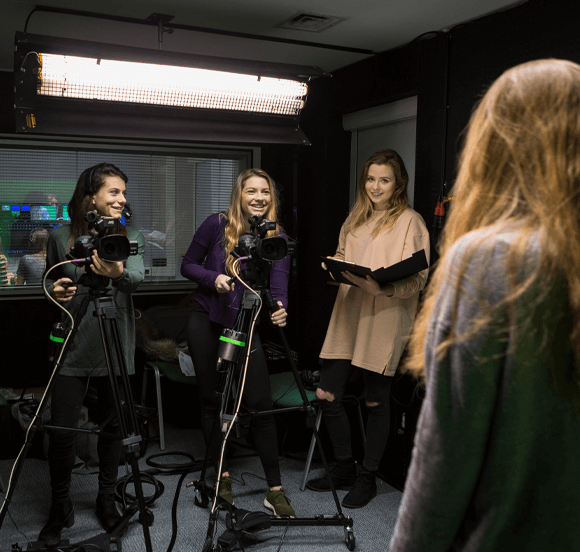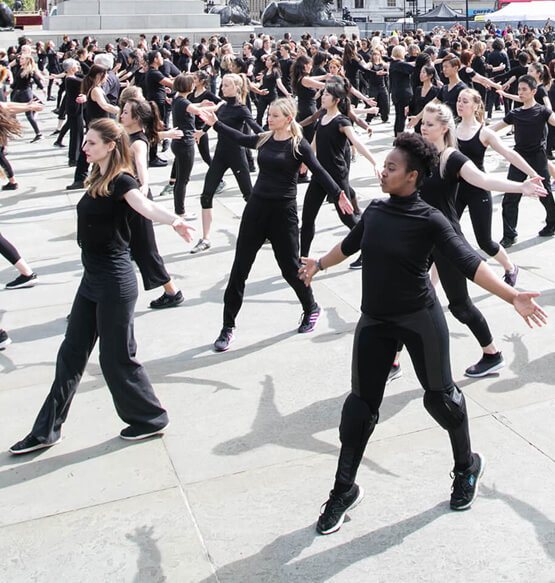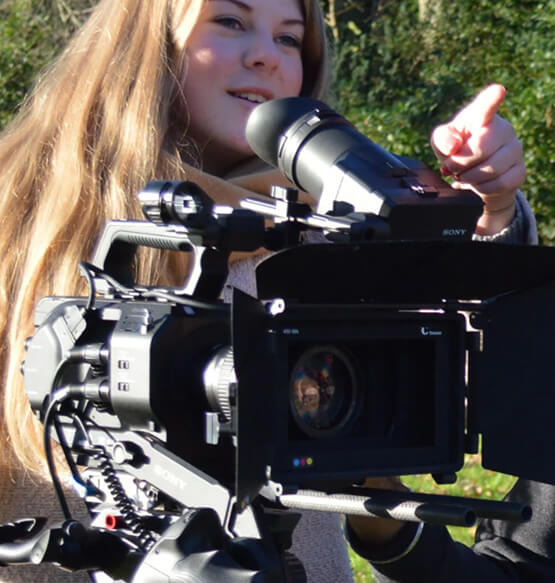You'll need:
112–128 UCAS points (or equivalent)
Foundation Year: 64–80 UCAS points (or equivalent)
International Foundation Pathway:
64 UCAS (or equivalent)
IELTS: 5.5
UCAS codes:
P300
P301 (if choosing Foundation Year)
Start date(s):
September 2026
Step into the world of modern media and communications. The BA Media and Communications programme will equip you with the creative, technical, and strategic skills needed to succeed in an ever-evolving media landscape.
You’ll explore a range of platforms including social media, digital media, television, film, radio, and emerging technologies, gaining both practical experience and critical insight into how media shapes society.
Our aim is to prepare you as a media professional of the future, with the skills, portfolio, and confidence to thrive across creative industries worldwide.
Did you know?
This Media and Communication Programme is accredited by The Chartered Institute of Marketing (CIM). The accreditation provides students with the opportunity to be part of a worldwide community of members and the opportunity to enhance their employability by taking CIM globally recognised professional qualifications in their initial steps towards Chartered Status.
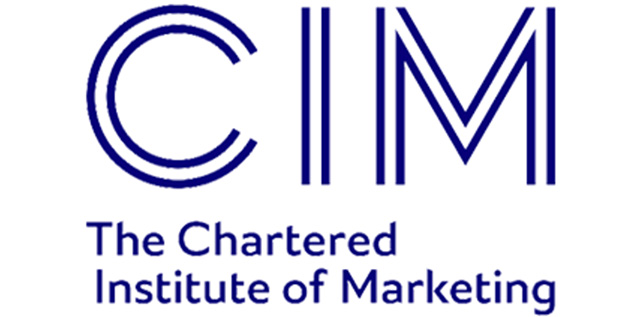
Top 3 modern university in London
(Complete University Guide 2025)

Ranked in the top 15% in the world
Times Higher Education Young University Rankings 2024

#8 in England for undergraduate student satisfaction
National Student Survey 2024

Modules
Module overview:
Digital technology has changed the way news is produced, packaged, distributed, consumed and used by readers and audiences.
This module will introduce you to the media business environment, providing a grounding in how the online news and social media industries operate. You will look at how media and communication work to influence society and the way we live our lives.
It focuses on the ways that digital technology affects the media production, while providing a grounding in news media analysis. The module will introduce you to debates about online news and social media, considering their possibilities and challenges.
How you'll learn:
You will learn through lectures and workshops. Lectures will cover the key learning material, key for sustainability, global engagement and professionally focused education. Workshops will consist of sessions where the material will be discussed in depth with the use of case studies, including student reviews and marketing of reports.
How you'll be assessed:
You will be assessed by a social media blog (30%) and an essay/report (70%).
Module overview:
This module equips you with the understanding, knowledge, and skills needed to craft and edit compelling fictional and non-fictional stories across various forms and media. It covers the cultural significance of storytelling from premodern societies to today’s digital age, emphasizing the importance of strong narratives in digital media content creation. Through a diverse range of expressions and formats including fiction, journalism, digital storytelling, blog posts, podcasts, and vlogs, you will explore global, multicultural, and inclusive materials and ideas.
Weekly topics offer stimulating ways into storytelling, with a formative assignment and workshops providing supportive forums for feedback. You will gain critical, professional, and creative skills through flexible assessments, analyse core narrative structures, and participate in a live workshop with a professional storyteller.
This module combines critical thinking and practical application, equipping you with the foundational skills which you will need to progress to the higher level of study in the disciplines of media, journalism and English. The ability to generate and shape strong narratives – and to reflect on their uses and meanings – is key to all content creation, from writing and the printed word in its many manifestations, including literary and journalistic, to online and media forms of storytelling. It is also key to a successful professional trajectory.
How you'll learn:
You'll learn through a weekly lecture and student led discussion as well as a seminar. In addition to standard lectures and seminars the module schedule includes in-class writing sessions, workshops, one fieldtrip, and one-to-one tutorials.
How you'll be assessed:
This module will be assessed using a Story (70%) and a Personal Reflection (30%).
Module overview:
This module equips you with the skills to create visual projects (photos and videos) for storytelling purposes. We encourage you to explore and experiment with a wide range of practices and techniques, including DSLR camera operation, lighting, composition, digital editing and post-production using industry-standard Adobe software.
The module introduces you to the languages, grammar, conventions, and techniques of digital video and stills production for online media. It provides the knowledge and skills required to work independently, creatively, and efficiently, either individually or as part of a small, budget-conscious crew on a short video project or photo shoot.
In this shared module, you may produce photos and videos from a journalism, media marketing, or creative perspective.
How you'll learn:
You'll learn through a combination of sessions designed to enhance learning and skill development. There will be a one hour lecture on some weeks and four hours of workshop teaching. On other weeks, additional small group learning sessions will be provided. Lectures will cover key learning material, focusing on sustainability, global engagement, and professionally oriented education. There will be time for individual tutorials.
How you'll be assessed:
The module assessment consists of two components: Photo Reportage and Video Project
Module overview:
The Communications Challenge module equips you with foundational knowledge and practical experience in strategic communication. The core focus is on addressing real-world communication problems using live briefs from industry clients or simulated business scenarios. By engaging with these live briefs, you will develop key communication strategies, create compelling content, and refine your collaboration and presentation skills. You will also critically reflect on their learning process, building essential skills for your future professional careers in communication and/or design.
How you'll learn:
You'll learn through weekly practical workshops. Workshops will cover the core principles of communication design and its practice through in-class discussions and hands-on work using real world examples. Specific focus will be given to providing lab space/time for you to individually research your own solutions to central communication challenges, alongside research in groups and feeding back/forward sessions as a whole class. There will be an additional 30 minutes of asynchronous digital support per week, focused on assessment support.
These are the current planned modules on this course and may be subject to change.
Module overview:
This module will teach you the craft of feature writing.
Anyone working in journalism or related communications fields will be expected to have a good grasp of how features are produced, packaged and promoted. The Art of the Feature will teach every aspect of the process, from coming up with original ideas to finding the right sources to professional-standard execution. The course is highly practical, with a different aspect of the process being taught each week and with extensive time devoted to exercises designed to hone your writing, reporting and researching skills.
You will learn how to produce work aimed at specific audiences. The focus will be on reporting and writing, but students will also learn how to package their work for digital and print publications. They will produce original text feature articles that incorporate images and hyperlinks, along with social media posts to promote them.
You will first learn about the main types of features and the websites, magazines and other publications that publish them. You will then learn, via lectures and workshops, about idea generation, reporting, incorporating images, and, of course, writing. The goal will be to learn how to produce compelling multimedia work for a target audience.
In line with the module’s focus on targeting audiences, you will also learn about the journalism industry, researching prospective companies that you can pursue for work placement opportunities in your third year.
How you’ll learn:
You’ll have a weekly lecture and two workshops, plus time for individual tutorials. Lectures, available 48 hours before class, cover key media business topics, while workshops focus on building your skills in media, product design, and development.
Each week, you’ll explore aspects like how magazines and websites operate commercially, research competition, and create marketing materials. You’ll engage in peer learning, team exercises, case studies, and hear from industry experts. You’ll also conduct your own market research by connecting with media professionals. Throughout the term, you’ll receive formative feedback on your presentations and analysis.
Module overview:
Interested in travel, sport, fashion, film, music and lifestyle? You will produce reviews, features and profiles to build a portfolio in the area of your choice. You will examine the role of content creators in some of today’s major debates, from the environmental impact of the fashion industry to corruption in sport. You will learn how copywriters create content that enables individuals, companies and organisations to communicate their message to the wider world.
Copywriting is about communicating the benefits of any product or service to its potential audience, and the skills that you will learn will empower your writing as either a professional copywriter or a content creator who is keen to maximise the impact of your written work.
Global industries depend on media specialists to communicate with the public, with other businesses, with local and national governments, with international organisations, and with their own employees. Content creators and copywriters perform a wide range of roles, both inside and outside an organisation, to facilitate the public’s access to information about products, services, and the organisation’s own functioning, decision-making and performance. They possess a remarkable professional mobility and adaptability, often moving seamlessly from one role to other, from outside a company to inside it, from journalism to PR, or from copywriting to journalism.
In each position they display a common set of skills: excellent professional writing, the ability to produce content in a variety of genres, formats and platforms, and the ability to evaluate, assess and summarise complex information. These are the skills you will develop.
How you’ll learn:
You’ll have a 2-hour interactive lecture and a 3-hour seminar each week, plus time for individual tutorials. Lectures cover weekly topics, and seminars are student-led workshops. You’ll also get 30 minutes of online support each week through additional digital content.
Module overview:
In Content Marketing, you will discover the dynamic interplay between creativity and strategic objectives. You will learn how to craft compelling narratives for digital platforms, leverage social media for targeted engagement, and apply metrics and analytics to measure content performance. By examining the processes of planning, creating, and distributing digital content that aligns with organisational marketing strategies, you will gain a thorough grounding in the creative, analytical and ethical dimensions of modern marketing. Through workshops and case studies, you will hone your ability to produce engaging content, evaluate its effectiveness, and integrate it into broader marketing campaigns. Evaluation of marketing strategies is also a key topic, both return on investment as well as environmental and social impact across the campaign lifecycle. Ultimately, you will be equipped with the skills to develop a comprehensive content marketing strategy and a portfolio of work ready to showcase to potential employers or stakeholders.
How you’ll learn:
You’ll learn through weekly seminars and workshops focused on hands-on, task-based learning to build the skills you need for assessment. You’ll also have access to recorded videos and interactive materials for additional online support each week.
Module overview:
In this module, you will explore how to transform complex data into meaningful and engaging narratives. You will develop the skills to interpret, visualise, and communicate data effectively using storytelling principles and data visualisation techniques.
You will learn how to apply key visual communication principles to enhance the impact of data-driven messages. Through a combination of theoretical study and hands-on practice, you will create your own data visualisations and infographics, tailoring them to specific audiences. You will gain experience in selecting, organising, and analysing real-world datasets to uncover insights and present them through compelling visual stories.
As you progress, you will work with industry-standard tools such as Tableau, Excel, and Adobe Illustrator, learning best practices in infographic design, interactive storytelling, and ethical data representation. You will also explore the role of generative AI in data visualisation, considering its applications, limitations, and ethical implications.
By the end of this module, you will have developed a professional portfolio of data storytelling projects, equipping you with the knowledge and skills to communicate complex information clearly and persuasively in both academic and professional settings.
You will be encouraged to focus on important issues facing society in your practical work, either at a local, national or international level (sustainability and global engagement). As part of that, you will learn how to identify and interact with credible sources of information, and how to make use of data and analysis in your infographics (professionally focused education and technology-enhanced learning). Exemplary data sets will draw on climate statistics, local and global data relating to key issues in health, education and the distribution of wealth.
You will design and produce visualisations and infographics that communicate these important societal issues to target audience in accessible languages (sustainability; equity, diversity and inclusion; global engagement).
How you’ll learn:
You’ll learn through a combination of lectures, workshops, and asynchronous learning activities to support you in developing both theoretical and practical skills in data storytelling.
These are the current planned modules on this course and may be subject to change.
This course offers all students the option of a one-year paid work placement, to boost your employability even further. If you choose this route, you will take the placement following year two of your course, and then return to complete your degree.
Why take a placement?
A placement year is the perfect opportunity to gain valuable work experience, to build on the career skills we will teach you on this degree. The connections you make on the placement will improve your career prospects further, and equip you with the skills you need to secure graduate-level employment.
How we support you
The University's Placement and Work Experience Team are experts at helping you to secure a placement. They will work closely with you from the start, helping you research potential employers, discover placement opportunities, create and pitch your CV, and will coach you to perform well in interviews. We aren't able to guarantee a placement, but our sector-leading advisors will give you the best possible chance of securing one.
Find out more about how we'll support you
We understand that your plans might change once you start your programme. If you decide not to do a placement, you will have the option of completing the three year version of your programme.
Whatever your choice, you will have access to many opportunities for work experience through our Placement and Work Experience Team, and access to face-to-face and 24/7 online careers support.
Module overview:
This module will cover the theoretical, implementational and professional skills you need to understand the role of Public Relations (PR) in business and its place in an organisation’s mix of marketing and integrated communications resources. In addition, it will equip you with the techniques and practices that will prepare them for future employment opportunities in PR.
Using authentic briefs and examples you will learn how to integrate social media, digital media campaigns, and strategic partnerships (e.g. with government, trade organisations, and charities) into your projects. They will develop comprehensive integrated communications strategies, utilising social media platforms for engagement, and will create targeted PR plans that are aiming to induce behavioural change in customers and the general public.
How you’ll learn:
You’ll learn through weekly lectures, seminars, guest lectures, and practical workshops that explore how PR reflects and shapes contemporary consumer culture. You may also visit PR companies and take part in real-life scenarios using a problem-solving approach. Each week, you’ll have access to additional online support, including recorded summaries, quizzes, forums, and exemplar discussions.
Module overview:
This module focuses on project management principles and practices tailored to creative industries. Topics include creative project lifecycle management, resourcing, stakeholder engagement, intellectual property considerations, budgeting for creative endeavors, leadership and managing creativity within constraints. It explores a variety of traditional, Agile and Hybrid model of project management, offering students the opportunity to gain valuable hands-on experience with a different project management tool and output in each session (for example schedule, risk assessment, communication plan, Agile iteration, hybrid plan). Real-world case studies from diverse creative industries will anchor the curriculum in professional practice.
In keeping with Roehampton’s five pillars, the module will integrate sustainability principles into project management practices, by teaching you how to assess the environmental impact of your projects and exploring projects that focus on developing sustainable solutions for real-world problems as case studies, thus encouraging you to consider long-term impacts. It will also respond to objectives of equity, diversity and inclusion by including case studies from diverse industries and cultures, showcasing different project management practices and perspectives, and facilitating group projects that require collaborative input from team members with varied backgrounds, promoting inclusivity and understanding of diverse viewpoints.
You will be encouraged to explore case studies of projects that involve international stakeholders or issues, such as the management of projects in developing countries, and will learn to use virtual collaboration tools to connect with professionals from different countries, as is common practice in the industry, thus fostering a global perspective in project management. The practically oriented sessions simulate real-world project management scenarios, allowing you to apply theoretical knowledge to practical situations. Industry professionals will be invited to lead workshops or guest lectures on current trends and challenges in project management, enhancing the relevance of the curriculum and responding to the objectives of a professionally focused education. Finally, you will use a range of digital tools and platforms, from established software packages such as Trello to new AI-powered tools, to familiarize themselves with industry-standard technology.
How you’ll learn:
You’ll learn through weekly seminars and interactive workshops focused on project management theory and practice. You’ll explore real-world case studies, engage in practical exercises, and hear from industry professionals. In workshops, you’ll work on your own project using different tools and models (including AI), creating weekly deliverables that build toward your final assessment. You’ll also have weekly online support with assessment-focused
Module overview:
This module will prepare you for the media world. You will learn about how the industry is changing and adapting to new technology. You will consider such issues as what impact artificial intelligence will have as you and your fellow students enter the creative industries.
The demands to produce and distribute media and news faster via more speedy mobile networks and more powerful mobile devices have reshaped journalism and the creative industries. Artificial Intelligence (AI) and social media are among the main drivers transforming content production.
This module is geared towards providing a deeper awareness of the changing media industry from both an academic and professional viewpoint. You will learn about critical developments and transformations in industry practices, providing an appreciation of issues and concepts that will be vital if you wish to thrive in your chosen workplace.
How you’ll learn:
You’ll attend lectures covering core material to support your professional development and graduate outcomes. Workshops will let you explore that material through case studies, practical tasks, and skills-focused activities. You'll also use AI tools to enhance your understanding and receive regular support through tutorials and online resources. You'll review and assess past student work using marking guidelines to deepen your understanding of assessment criteria.
Module overview:
This module gives you the chance to complete an individual project that reflects your interests and builds on what you’ve learned throughout your degree. You’ll work to your strengths, with a focus on research, innovation, and professional execution. Your project format should suit your course. Alternatively you may undertake a consultancy project with a portfolio documenting your process and outcomes.
How you’ll learn:
You'll take part in project workshops to define your project and understand the assessment. After that, supervision will be tailored to your project, with regular check-ins and support throughout the term. You'll also have weekly digital support with additional online resources.
Module overview:
This module provides an opportunity for an optional work placement year between the second and third year of the degree.
This module is available as an option to all students studying on the listed programmes. This one-year (sandwich year) module is additional to the 360 credits of a 3-year degree programme.
Participating in a work placement year will enable you to develop employability skills across a longer period. It thus complements and builds on the employability skills developed through the curriculum throughout the first two years of the degree programme.
These are the current planned modules on this course and may be subject to change.
This course offers a foundation year, which takes place at the beginning of your studies. Studying a foundation year will give you academic and practical experience, and a strong introduction to your subject, ensuring you succeed on your undergraduate degree.
30 credits
You will develop your core academic and integrated English language skills of speaking, listening, reading and writing. You will become familiar with key academic skills and concepts, such as referencing methods and awareness of academic integrity and tone. You will apply these skills and knowledge to both broad topics and also your chosen subject pathway.
Teaching and learning
You will be required to actively engage in on-campus learning for up to 10 hours a week.
You will be taught through a full range of teaching and learning methods, which include lectures, seminars, workshops, discussion groups, group directed tasks and presentations. This will enable you to learn from your peers and tutors in both structured and information settings.
You will be encouraged to think creatively about your approach to learning and discussions with your peers. You will also have access to recordings, resources, links and signposting through Moodle to enrich your learning.
Assessment
You will be assessed through group and individual presentations, comparative and reflective essays, multiple choice exams, coursework and reports, oral exams, portfolios, case studies and blogs.
30 credits
You will develop your core academic and integrated English language skills of speaking, listening, reading and writing. You will become familiar with key academic skills and concepts, such as referencing methods and awareness of academic integrity and tone. You will apply these skills and knowledge to both broad topics and also your chosen subject pathway.
Teaching and Learning
You will be required to actively engage in on-campus learning for up to 10 hours a week.
You will be taught through a full range of teaching and learning methods, which include lectures, seminars, workshops, discussion groups, group directed tasks and presentations. This will enable you to learn from your peers and tutors in both structured and information settings.
You will be encouraged to think creatively about your approach to learning and discussions with your peers. You will also have access to recordings, resources, links and signposting through Moodle to enrich your learning.
Assessment
You will be assessed through group and individual presentations, comparative and reflective essays, multiple choice exams, coursework and reports, oral exams, portfolios, case studies and blogs.
30 credits
You will develop your research, numeracy and information technology skills. You will investigate the difference between primary and secondary research, conduct your own research project and demonstrate your findings through data analysis. You will also develop your awareness of equality, diversion and inclusion in the UK, through a real-world issue; discrimination in the workplace.
Teaching and learning
You will be required to actively engage in on-campus learning for up to 10 hours a week.
You will be taught through a full range of teaching and learning methods, which include lectures, seminars, workshops, discussion groups, group directed tasks and presentations. This will enable you to learn from your peers and tutors in both structured and information settings.
You will be encouraged to think creatively about your approach to learning and discussions with your peers. You will also have access to recordings, resources, links and signposting through Moodle to enrich your learning.
Assessment
You will be assessed through group and individual presentations, comparative and reflective essays, multiple choice exams, coursework and reports, oral exams, portfolios, case studies and blogs.
30 credits.
This module invites you to take on the role of a video content creator, building on the skills acquired in Fundamentals of Image Making. You will examine the dynamic world of social media as news, with a particular focus on the theme of "identity." You will explore the impact of distributed media, examining how non-professionals contribute to shaping new media practices through platforms like YouTube, TikTok and Instagram.
Throughout the module, you will critically engage with the history and implications of self-promotion on social media, analysing its influence on society and the efforts to address its challenges. You will also explore citizen journalism, where social media content plays a pivotal role in reporting on crises and events inaccessible to traditional news outlets.
Teaching and learning
In weekly seminars, you will explore citizen journalist strategies – from video blogging to video editing – for creating engaging media content. Alongside these hands-on activities, you will engage deeply with thought-provoking questions about identity, voice, and representation in the digital age.
By the end of the module, you will have the skills to create compelling video content and a nuanced understanding of the role of social media in shaping our world.
The teaching delivery for each module consists of one, one-three-hour lecture and one, two-hour workshop per week. Lectures will provide a critical foundation, introducing key concepts such as identity, social media and citizen journalism, while seminars will focus on hands-on skill development.
There will be an additional 30 minutes of online digital support per week. This will consist of virtual learning tools to extend access to resources through online tutorials, videos, and discussion forums.
Due to the highly technical nature of this module, you will be taught in a computer lab equipped with Adobe Creative Suite to support the required software-based learning outcomes.
You will also have access to DSLR cameras, microphones, lighting equipment, and a dedicated photography/filming studio, to facilitate practical exercises in media production.
Assessment
This module will be assessed using critical commentary and a self-produced video.
30% - critical commentary, you will explore the module theme ‘identity’. You will critically analyse a piece of video content that engages with the concept of identity.
70% - self-produced video, you will produce a four-minute video as a piece of citizen bases, engaging with the module theme of ‘identity’.
30 credits
In this module, you will critically explore how media representations are constructed and manipulated. You will examine semiotics, framing, and context, understanding how these elements influence perception.
The module will also address the social and cultural impacts of altered imagery, focusing on the concept of authenticity and the ethical considerations of image manipulation, while reflecting on historical perspectives of visual content authenticity.
You will gain practical skills in photography, learning to control key technical aspects like aperture, shutter speed, ISO, and colour temperature. You will also explore the use of natural and artificial lighting to create specific moods, alongside composition techniques such as focal length and depth of field to enhance your imagery.
The module also introduces you to Adobe Photoshop, starting with basic tools and non-destructive editing techniques. You will advance to more complex methods like masking and compositing, developing a cohesive photographic project. Finally, you will manage workflows and deadlines, preparing your work for an online portfolio to showcase your skills as both a photographer and an image-maker.
Teaching and learning
The teaching delivery for each module consists of one, one-three-hour lecture and one, two-hour workshop per week. Lectures will provide a critical foundation, introducing key concepts such as media practices, and image construction, whilst seminars will focus on hands-on skill development.
There will be an additional 30 minutes of online support per week. This will consist of virtual learning tools to extend access to resources through online tutorials, videos, and discussion forums.
Due to the highly technical nature of this module, you will be taught in a computer lab equipped with Adobe Creative Suite to support the required software-based learning outcomes.
You will also have access to DSLR cameras, microphones, lighting equipment, and a dedicated photography/filming studio, to facilitate practical exercises in media production.
Assessment
This module will be assessed using a research presentation and a creative online portfolio.
30% - research presentation, you will deliver a 5-minute in class exploring the module of theme of ‘authenticity’. This will involve selecting a visual event from a media-related field and critically analysing how the chosen image(s) engage with the concept of authenticity.
70% - creative online portfolio, you will produce a photographic series that creatively interrogates the notion of ‘authenticity of the image’.
These are the current planned modules on this course and may be subject to change.
Why study Media and Communications at Roehampton?
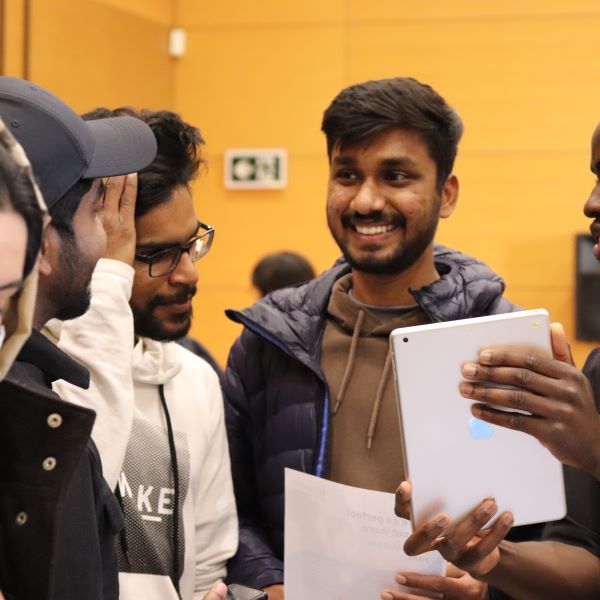
Learn across the full spectrum of media
You’ll cover content creation, digital campaigns, public relations, media strategy, audiovisual production, and immersive media experiences.
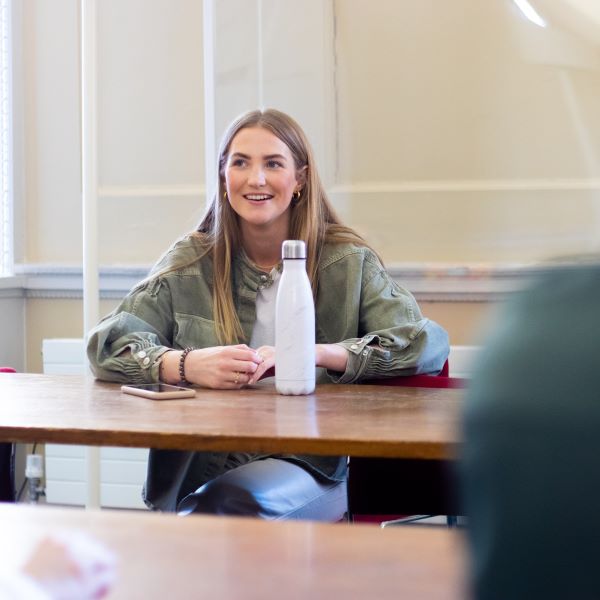
Benefit from practical, industry-focused teaching
Guided by expert practitioners, you will build a professional portfolio through authentic projects, multimedia campaigns, and real-world briefs using diverse media platforms.

CIM-accreditated programme:
Our accreditation by the Chartered Institute of Marketing (CIM) gives you access to professional networks and resources, and the opportunity to gain an additional industry-recognised qualification. This competitive edge opens doors to marketing and communications careers globally.
Career
A degree in Media and Communications from Roehampton prepares you for a dynamic and evolving range of careers across the media, creative, and digital industries.
Our programme is designed to help you build the confidence, creativity, and transferable skills needed to thrive in fast-paced professional environments. You’ll graduate with practical experience in digital content production, communication strategy, media analysis, and audience engagement, all of which are highly valued across the communications, marketing, and creative sectors.
You’ll develop skills including:
- Social media management and digital marketing
- Public relations, reputation management, and strategic communications
- Content production for video, audio, and interactive media
- Copywriting, storytelling, and multi-platform content creation
- Event promotion and campaign planning
- Research, analytics, and insights into audience behaviour
- Project management, collaboration, and creative problem-solving
- Ethical and responsible decision-making in media contexts
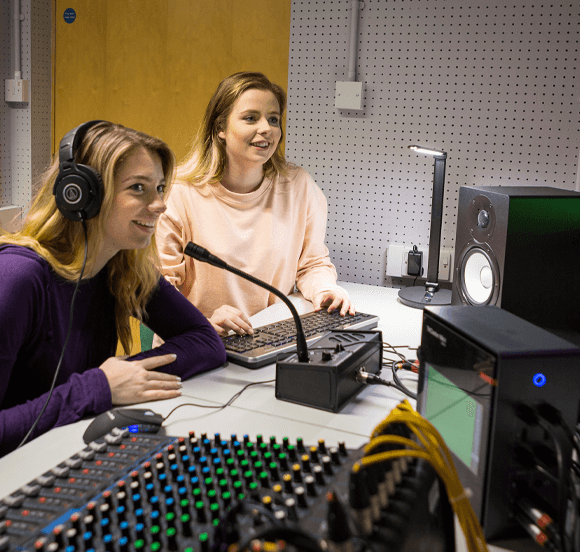
Graduates leave Roehampton ready for professional success - with both practical skills and critical understanding.
You will be:
- Career-ready, with experience across media platforms and projects
- Aligned with industry needs, including eSports and immersive media trends
- Confident in professional knowledge, research, and problem-solving
- Skilled in ethical and responsible communication
- Prepared for roles in media production, digital marketing, PR, and beyond
- With Roehampton’s CIM accreditation, you’ll have the option to pursue a professional qualification alongside your degree.
The Student Futures team is here to support you throughout your time at Roehampton and beyond.
They offer services tailored to your needs, helping you take confident steps towards your future.
You’ll have access to a wide range of career workshops and events, where you can engage with employers and develop the skills you need to succeed in the workplace.
These opportunities will help you build your CV, prepare for interviews, and connect with successful Roehampton graduates who are thriving in their careers. You’ll also be able to engage with our partners across London and beyond.
Wherever you want to go in the future, you'll be preparing for the world of work from your very first day.
Learning and assessment
Your time at Roehampton is creative, immersive, and collaborative. You’ll experiment with design, and refine ideas in workshops, seminars, and project-based learning.
How you'll learn
- Studio and lab work: practical skills for production and design
- Industry-led projects: briefs, campaigns, and media simulations
- Small-group seminars and tutorials: personalised guidance from tutors
- Guest lectures and field trips: insights from leading media professionals
- Professional software: tools for video editing, social media analytics, design, and eSports management
How you'll be assessed
Your assessments will mirror the Media and Communications industry, including individual and team projects.
This will ensure you’re fully prepared for life after graduation. Your assessments will include:
- Creative Media Projects
- PR Campaigns
- Case Study Projects
- Reflective Essays
- Presentations
- Portfolio Work
These hands-on assignments will equip you with the skills and experience needed for a successful career in media and communications.
Open days
Get a real taste of our campus, community and what it’s like to study at Roehampton
Applying
Full-time UK undergraduate students apply through UCAS.
Entry tariff
112–128 UCAS points (or equivalent)
Foundation Year: 64–80 UCAS points (or equivalent)
Looking to work out your UCAS points or find out about our entry requirements? Find out more.
When we consider applications to study with us, we form a complete view of your achievements to date, and future potential, and can offer flexibility in entry requirements. Find out more about our Contextual Offer scheme.
We welcome applicants with a wide range of qualifications, including BTECs, A-levels and T Levels.
General entry requirements
International undergraduate students apply through our direct application system.
Entry tariff
112–128 UCAS points (or equivalent)
International Foundation Pathway:
64 UCAS (or equivalent)
IELTS: 5.5
Looking to work out your UCAS points or find out about our entry requirements? Find out more.
When we consider applications to study with us, we form a complete view of your achievements to date, and future potential, and can offer flexibility in entry requirements. Find out more about our Contextual Offer scheme.
General entry requirements
Fees and funding
UK students
Tuition fees
| Entry date | Undergraduate Year 1 | Undergraduate Foundation Year |
|---|---|---|
| September 2026 | £9,790 | £5,914 |
Prices shown are for the first year of your degree.
Funding your studies
We also provide other ways to support the cost of living, including on-campus car parking, hardship support and some of the most affordable student accommodation and catering in London.
International students
Tuition fees
| Entry date | Undergraduate Year 1 | Undergraduate Foundation Year | International Foundation Pathway |
|---|---|---|---|
| September 2026 | £17,628 | £17,628 | £17,628 |
| January 2027 | – | – | £17,628 |
Prices shown are for the first year of your degree.
Funding your studies
We also provide other ways to support the cost of living, including on-campus car parking, hardship support and some of the most affordable student accommodation and catering in London.


